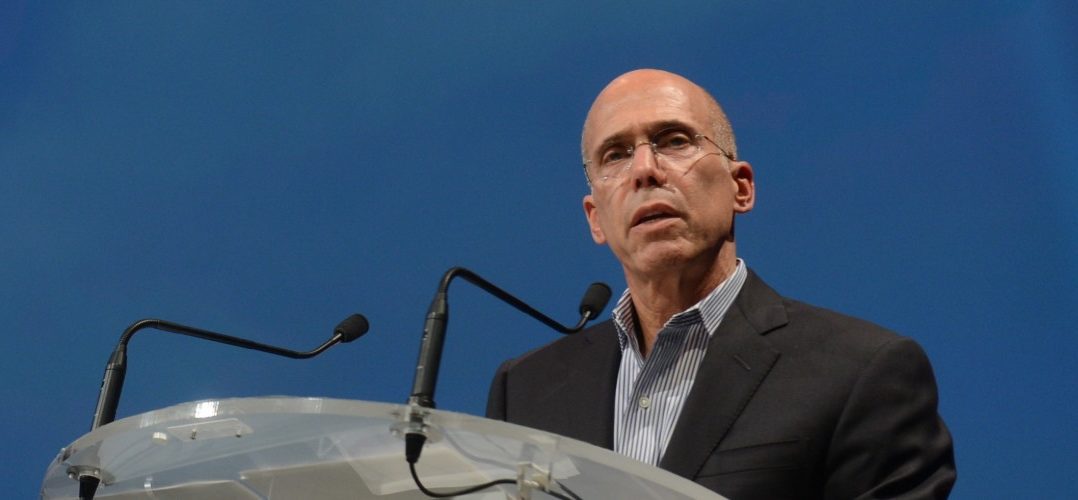The extremely well-oiled PR machine is dropping a new announcement/news/fun-fact about it every day. If you’ve lived under a rock for the last few months, Quibi is a new content venture by Jeffrey Katzenberg (pictured above at MIPCOM 2013, in his former role as DreamWorks CEO) and Meg Whitman (former CEO of eBay and HP). It’s an acronym for ‘Quick Bites’, and is a new streaming service dedicated to mobile phones. Content on Quibi will run for 7-10 minutes per episode or piece.
This is not just another OTT pipe dream. According to Quibi, it already raised a billion dollars, and it plans on raising another 500 million from leading content and technology companies. Quibi also announced that they already sold ⅔ of the ad space inventory for the first year for 100 million dollars (to advertisers such as Pepsico and Walmart). An unprecedented achievement for an entity that hasn’t broadcast a single frame or acquired any customers yet.
For creators, Quibi is a super attractive platform. To attract leading talents, Quibi offers to finance up to 140% of production. After two years, creators are also free to re-edit their content into a continuous long-form piece and try to re-sell it. This goes against the typical media behemoth’s pattern of attempting to grab as much IP as possible, and makes Quibi much more appealing for the creators than Netflix, for example, that strips creators of their rights forever.
Quibi is in a frenzy of productions at the moment. Katzenberg claims that over 185 projects have been pitched already, 2 shows are already complete and 4 in production. For the April 2020 launch, Quibi is planning to have 7,000 episodes (or ‘quibis’, the name pf the 7-10 minute content pieces) with a budget that will go as high as $125,000 per minute in the flagship shows.
This all sounds great until you consider consumers. According to reports, Quibi will cost $5 a month with ads and $8 without. Whitman expects 75% of the users to pick up the $5 offer. They will watch 6 or 10 seconds long a non-skippable ad if the content is less than 5 minutes long and for the longer bites 15 seconds long of ads.
Everyone in the industry is trying to estimate if that is going to be a game-changer, or a titanic-sized failure. The sceptical voice says it’s tough these days to convince people to pay for content – certainly when you don’t have brands like Game of Thrones, The Handmaid’s Tale or Friends.
The optimistic voice agrees but points to the dramatic growth of daily viewing over the cellular phone. It’s truly spectacular – since 2012, the time spent watching video content over the phone has jumped from 6 minutes a day to more than 70 minutes daily – quite a bit of it in short-form videos on YouTube.
The sceptic then says – YouTube? YouTube is constantly failing to launch premium paid products from its customers, who like to get their video for free.
And the optimistic argues that not so long ago, people used to get music for free. Now they are willing to pay Spotify and Apple $10 a month for a convenient and legal interface.
The sceptic might ask – seriously, is there any real innovation here?
Eyes lit up, the optimistic claims that Meg Whitman declared that they are making a product that is in a league of its own, setting a new standard. Whitman is developing a content navigation system that will upgrade the user experience especially of the bottleneck of content discovery. They are also working on a better system to upgrade the colour separation and light adjustment on the mobile device so even in the sunlight – the quality won’t be damaged.
« They’ll try to develop everything in-house!? », the sceptic exclaims. Ad-platform, broadcasting platform, and content creation, all homegrown? With all due respect to the product, by the time they launch next year, the market will be crowded with many well-established and recognised brands like Apple TV Plus, Disney Plus, Warner and possibly also NBC’s service, all with best in breed technology. Not only that, the old players like Netflix announced that they will start producing short-form content as well.
And the optimistic will say – their investors are some of the most prominent content organisations in the market (Disney, Warner, BBC Studios and Comcast) so they won’t be aiming to hurt their investment.
Yeah well, the sceptic would say – these investors are just covering their bases. If Quibi is even mildly successful, they will not want Quibi to cannibalise their TV channels.
You’re looking at it all wrong, the optimistic says, Katzenberg says that Quibi is neither a substitute nor a competitor to television. TV is for the evening in your living room – Quibi is what you do during the day, between 7 am and 7 pm. It’s what you watch in the line at Starbucks, on the subway ride, or in the bathroom. In other words, direct competition is Facebook, IGTV, and YouTube.
Maybe, the sceptic nods, but we all remember the billion dollars spent on Verizon’s Go90 or Samsung’s MilkyWay venture or NBC’s SeeSo.
Well, the one thing everyone in the market agrees about is that you never bet against Jeffrey Katzenberg, who claims that those ventures didn’t have deep enough pockets to create a valuable offer. And if Katzenberg thinks the market is ready for such an enterprise – his gut feeling might be correct. And that’s not just him and Whitman. They also recruited a dream-team of managers like Roger Lynch, CEO of Condé Nast and former CEO of Pandora; Mellody Hobson, president of Ariel Investments and former chairwoman of DreamWorks Animation; Ann Daly, co-founder at WndrCo Holdings and former president of DreamWorks, and more. The 135 employees are from NBCUniversal, CBS, TBS, Vice, Netflix, Funny or Die, Lionsgate, Makeready, Snap, TBS.
It’s interesting to examine the projects already announced. They combine an appeal to audiences of early adopters with sci-fi programs and programs about internet culture, with audiences of 30+ by reviving the brands they’ve grown up on, such as Singled Out and Punkd. Producing noise-generating content with some sexy dramas and plenty of content that comes with a familiar face? The commissioning strategy is exceptionally well thought-through.
It’s interesting to examine the projects already announced. The commissioning strategy is exceptionally well thought-out. At first, it seemed like they are trying to appeal to early adopters with sci-fi programmes and shows about internet culture. But the unique structure and framing of Quibi means that they cannot buy any content libraries, and so need to have a lot of content – so they are already thinking ahead and are announcing new commissions for wider audiences.
Audiences of 30+ will be excited about the revival of the brands they grew up on, such as Singled Out and Punkd. For even older audiences, documentaries by the BBC and a remake of The Fugitive (the 60’s TV series that turned into a hit 90’s movie) were ordered.
Not forgetting the star power! The classic female audience may find an interest in Tyra Banks‘ documentary series about beauty, and the male audience may like Idris Elba’s edgy car show. There’s also a new twist on music reality shows led by Justin Bieber; a collaboration with Telemundo for a prequel to a successful telenovela; a project by Guillermo del Toro, about zombies; a drama about the life of Snapchat’s founder; A Million Thanks, in which Jennifer Lopez gives $100K to someone who has done her something good, who in turn gives half of the money to someone else who will give someone else and so on; Wolves & Countryside, a sexy drama starring Naomi Watts; and a naughty comedy about the relationship between a writer and her boyfriend’s sex doll. Finally, the most recent announcement is a nature series from BBC Studios, about female animals.
It is clear that Quibi’s strategy is similar to those used previously for creating a new classic behemoth broadcaster, but updated for 2019. Some noise-generating content, with some sexy dramas, and plenty of content that comes with a familiar face. An attempt to let anyone find a reason to subscribe.
In addition, Katzenberg talked about his plans for 2 short daily newscasts, a sports show and a roundup of the late night shows.
Will it succeed or fail – with these people, that content and those pockets – Quibi is going to be the most interesting roller coaster ride around.




